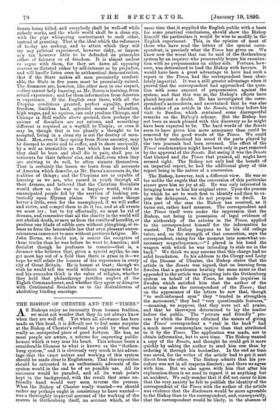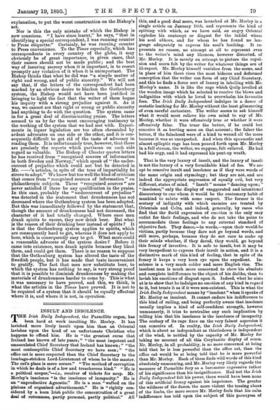THE BISHOP OF CHESTER AND THE "TIMES."
AS Bishops enjoy no immunity from human frailties, we must not wonder that they do not always know when they are well off. Yet when all allowance has been made on this head, it is difficult not to feel some surprise at the Bishop of Chester's refusal to profit by what was really an unexpected piece of good fortune. He has, as most people are aware, a scheme for improving public- houses which is very near his heart. This scheme bears a considerable likeness to what is known as the "Gothen- burg system," and it is obviously very much to his advan- tage that the exact nature and working of this system should be made clear to Englishmen. That this exposition should be entrusted to an enthusiastic advocate of the system would in the end be of no possible use. All its successes would be paraded, and all its weak points kept in the background, with the result that some un- friendly hand would very soon reverse the process. What the Bishop of Chester really wanted—we should rather say perhaps ought in consistency to have wanted— was a thoroughly impartial account of the working of the system in Gothenburg itself, an account which, at the same time that it supplied the English public with a basis for some practical conclusions, should show the Bishop himself the particulars it would be wise to modify in the English experiment. This, in the opinion of most of those who have read the letters of the special corre- spondent, is precisely what the Times has given us. We know now the worst that can be said of the Gothenburg system by an inquirer who presumably began his examina- tion with no prepossession on either side. Fortune, how- ever, was determined to load the Bishop with favours. It would have been a great advantage to have had such a report in the Times, had the correspondent been abso- lutely impartial. It was a still greater advantage when it proved that the correspondent had approached the ques- tion with some amount of prepossession against the system, and that this was so, the Bishop's efforts have placed beyond a doubt. He has investigated the corre- spondent's antecedents, and ascertained that he was also the author of an article in the Senate, written before his visit to Sweden, which contained some disrespectful remarks on the Bishop's scheme. But the Bishop has not been as much pleased with this discovery as he might have been expected to be. The hard words of the Senate seem to have given him more annoyance than could be removed by the good words of the Times. We could have better understood his mood if the parts played by the two journals had been reversed. The effect of the Times' condemnation might have been only in part removed by the approval of the Senate. But seeing it was the Senate that blamed and the Times that praised, all might have seemed right. The Bishop not only had the benefit of an impartial report, he had the additional glory of this report being in the nature of a conversion.
The Bishop, however, took a different view. He was so far unlike the angels that the conversion of this particular sinner gave him no joy at all. He was only interested in bringing home to him his original error. Upon the process by which he set to work first to identify and then to ex- pose the delinquent, we do not propose to dwell. In this part of the case the Bishop has received, as it turns out, rather hard measure. The correspondent and the Times itself were under the impression that the Bishop, not being in possession of legal evidence of the authorship of the articles in the Times, applied to the correspondent himself for the information he wanted. The Bishop happens to be his old college tutor, and, on the strength of that connection, says the correspondent, rising for the moment into somewhat un- necessary magniloquence,—"I placed in his hand the weapon with which he was intending to stab me in the back." We think we may assume that this charge had no solid foundation. In his address to the Clergy and Laity of the Diocese of Chester, the Bishop states that the article in the Senate was signed, that on learning from Sweden that a gentleman bearing the same name as that appended to the article was inquiring into the Gothenburg system on behalf of the Times, he made inquiries in Sweden which satisfied him that the author of the article was also the correspondent of the Times ; that on the appearance of the letters he saw that, though "to well-informed eyes" they "tended to strengthen the movement," they had "very questionable features," —meaning, we suppose, that they were not all praise, and that he thereupon determined to lay the matter before the public. The "private and friendly" pro- cess by which the Bishop obtained the means of giving the Times' correspondent a "stab in the back" had a much more commonplace motive than that attributed to it by the Times. The application was made, not to obtain information, but to save time. The Bishop wanted a copy of the Senate, and thought he could get it more quickly by asking the author to send him one than by ordering it through his bookseller. In the end no time was saved, for the writer of the article had to get it sent direct from the office. The Bishop admits that his pro- cedure was not in all respects discreet ; and there we agree with him. But we also agree with him that after his explanation there is no need to regard it as anything but an accident. We only wonder that it did not occur to him that the very anxiety he felt to publish the identity of the correspondent of the Times with the author of the article was evidence that the disclosure would be more agreeable to the Bishop than to the correspondent, and, consequently, that the correspondent would be likely, in the absence of
explanation, to put the worst construction on the Bishop's act.
Nor is this the only mistake of which the Bishop is now conscious. "I have since learnt," he says, "that in identifying a special correspondent, I was running counter to Press etiquette." Certainly, he was running counter to Press convenience. To the Times especially, which has correspondents in every country of the globe, it may obviously be of great importance, in given cases, that their names should not be made public; and the best way of insuring secrecy when it is important, is to resent promptly any violation of it when it is unimportant. The Bishop thinks that what he did was "a simple matter of right and wrong, and of public sincerity." We will not say that, if the letters of the correspondent had been marked by an obvious desire to blacken the Gothenburg system, the Bishop would not have been justified in bringing to light the fact that the writer of them began his inquiry with a strong prejudice against it. As it was, we cannot see that right or wrong or public sincerity had anything to do with the question. The system came in for a great deal of discriminating praise. The letters seemed to us by far the most encouraging testimony to the working of the system that we had met with. Experi- ments in liquor legislation are too often chronicled by ardent advocates on one side or the other, and it is con- sequently difficult to get rid of the taste of advocacy in reading them. It is unfortunately true, however, that these are precisely the reports which partisans on each side regard as valuable. The Bishop of Chester quotes letters he has received from "recognised sources of information in both Sweden and Norway," which speak of "the under- current of prejudice which could not but be detected in Mr. —'s articles, in spite of the tone of impartiality he strove to adopt." We know but too well the kind of criticism that comes from "recognised sources of information" on philanthropic subjects. These "recognised sources" are never satisfied if there be any qualification in the praise. In this case, probably the "undercurrent of prejudice" was detected in the statement that drunkenness has not decreased where the Gothenburg system has been adopted. But this was immediately followed by the statement that, though the amount of drunkenness had not decreased, the character of it had totally changed. Where once men drank spirits to excess, they now drink beer. But what is the reason of their drinking beer instead of spirits ? It is that the Gothenburg system applies to spirits, which are consequently hard to get, whereas it does not apply to beer, which is consequently easy to get. What more could a reasonable advocate of the system desire?. Before it came into existence, men drank spirits because they liked them, and could get them. There is no reason to suppose that the Gothenburg system has altered the taste of the Swedish people, but it has made that taste inconvenient to gratify. The fact that men now substitute beer, to which the system has nothing to say, is very strong proof that it is possible to diminish drunkenness by making the materials of drunkenness harder to come by. This is what it was necessary to have proved, and. this, we think, is what the articles in the Times have proved. It is not to be required of a system that it should be equally effectual where it is, and where it is no in operation.



































 Previous page
Previous page